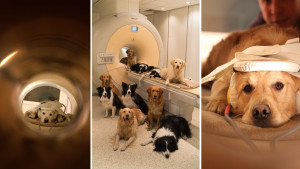I am an avid dog lover. I currently have three dogs that I love more than anything. Particularly, the youngest of the three which I am lucky enough to call mine. Sometimes my parents swear that, since I’ve been away at college, I miss my dogs more than I miss them, which may or may not be true considering how happy I get when I finally get to go home and see them. My emotions toward my dogs got me thinking, do they really know how I’m feeling? I know any time I’ve been sad, happy, angry, nervous, excited and every emotion in between, my dog seems to have a “sixth sense” about it. She knows how to react and approach me according to my mood, but does she truly know what that mood is? Can dogs read emotions? And if so, how?
As it turns out, many researchers believe dogs do understand how their human counterpart is feeling, the tricky part is determining how and to what extent.
According to one of the more recent, bigger, and advanced studies ever done on dogs, there is an emotion detector in the dog’s brain which is activated through voice. Published in the journal Current Biology, a team of researchers at Eötvös Loránd University in Hungary conducted an fMRI scan on 11 dogs. While the dogs were in the scanner, they wore headphones that played over 200 different sounds that ranged from human voices to dog noises to sounds of the environment as well as silence. Just like a human, the dogs’ brains reacted more to vocalized noises which showed emotion–whether it was from a human or dog–than to non-vocalized noises. Although there is no way to determine what exactly was going on in the dogs’ brains to make them react, it is safe to conclude that dogs can tell the difference between a sad noise, a happy noise, and so on and so forth.
Meanwhile, two separate studies conducted by the University of Tokyo (published in the journal PLOS ONE) and the University of Veterinary Medicine, Vienna alongside Ludwig Huber (published in the journal Current Biology) found that dogs were able to recognize human emotion by  watching their faces. The first study made the connection between dogs and yawning. By ruling out stress (because the dogs’ heartbeats did not speed up when they yawned), researchers concluded that the dogs were empathizing with their owners, especially since they were more likely to yawn when it was genuine and done by their owner and not a stranger. In the second study, where the dogs were trained to pick out the pictures of humans with happy and angry faces, dogs approached the happy faces faster and hesitated before approaching the angry faces, which caused researchers to conclude that “dogs were able to decipher between happy and angry faces because of their memories from other human relationships.” In other words, they were able to understand one emotion from the other.
watching their faces. The first study made the connection between dogs and yawning. By ruling out stress (because the dogs’ heartbeats did not speed up when they yawned), researchers concluded that the dogs were empathizing with their owners, especially since they were more likely to yawn when it was genuine and done by their owner and not a stranger. In the second study, where the dogs were trained to pick out the pictures of humans with happy and angry faces, dogs approached the happy faces faster and hesitated before approaching the angry faces, which caused researchers to conclude that “dogs were able to decipher between happy and angry faces because of their memories from other human relationships.” In other words, they were able to understand one emotion from the other.
A final study done by the University of London met all of the previously mentioned studies in the middle and concluded that it was a bit of both vocal and visual. The dogs in the study were more likely to go toward and submit to a person who was sad and crying than a person who was humming to spark their curiosity. By going toward the crying people, researchers decided that dogs were capable of differentiating between genuine emotion and lack thereof.
In my opinion, I think the study done by the University of London is on the right path. If studies are using different methods in order to test the same hypothesis but both methods are finding  the same result, it is more than likely a combination of both visual and vocal cues which allow a dog to relate to human emotions. However, there are a countless number of problems that could occur during such tests. For one, researchers may not be able to examine both theories at the same time. They also may never find a mechanism, working with dogs and not humans, it is unlikely that we will be able to know the driving force behind why dogs do what they do because we can never truly know how or what they’re thinking about. Inadequate sample sizes as well as confounding variables come into play, too. Despite this, all of the studies continue to state that dogs can recognize human emotion, it’s the ‘how they do it’ that will remain inconclusive, but no matter what, all of the conclusions have one thing in common: they will either be correct or a false positive.
the same result, it is more than likely a combination of both visual and vocal cues which allow a dog to relate to human emotions. However, there are a countless number of problems that could occur during such tests. For one, researchers may not be able to examine both theories at the same time. They also may never find a mechanism, working with dogs and not humans, it is unlikely that we will be able to know the driving force behind why dogs do what they do because we can never truly know how or what they’re thinking about. Inadequate sample sizes as well as confounding variables come into play, too. Despite this, all of the studies continue to state that dogs can recognize human emotion, it’s the ‘how they do it’ that will remain inconclusive, but no matter what, all of the conclusions have one thing in common: they will either be correct or a false positive.



Brooke, I definitely have to agree with you there. I had heard about Oscar beforehand, and I also found some research on cats while I was looking up dogs. However, I decided to look into it some more after you brought it up. This website I found does a great job at explaining cats. Even though it’s a blog, it discusses how the brain structure within cats is similar to that of a human’s which is what the first study I discussed in my post claimed about dogs. It also talked about facial recognition. It seems our furry friends aren’t too different after all.
I agree that dogs have the “sixth sense.” My dog is always right there when he senses one of us is crying or upset in any way and just lays there to comfort us. And I’d definitely agree with you that the University of London is on the right path because I know for my dog he really comes to comfort us when he sees us crying or an emotional disposition. Great idea for a post!
While the studies you showed did not prove that dogs can, it definitely supported that idea. The mechanism that they are lacking may be found later on. This article made me curious whether or not cats can also sense emotion from humans. I did some research, and found that can in fact sense emotions as dogs can . Dogs seem to be a little better at it, but both cats and dogs have better smelling and hearing than humans, allowing them to pick up emotional cues that humans cannot. Cats also seem to have a sixth sense, as Oscar (a nursing home cat from Rhode Island) was so accurate at predicting deaths that anytime the cat would lay on the bed with an ailing patient, the staff would immediately call that patients family to come and say goodbye.